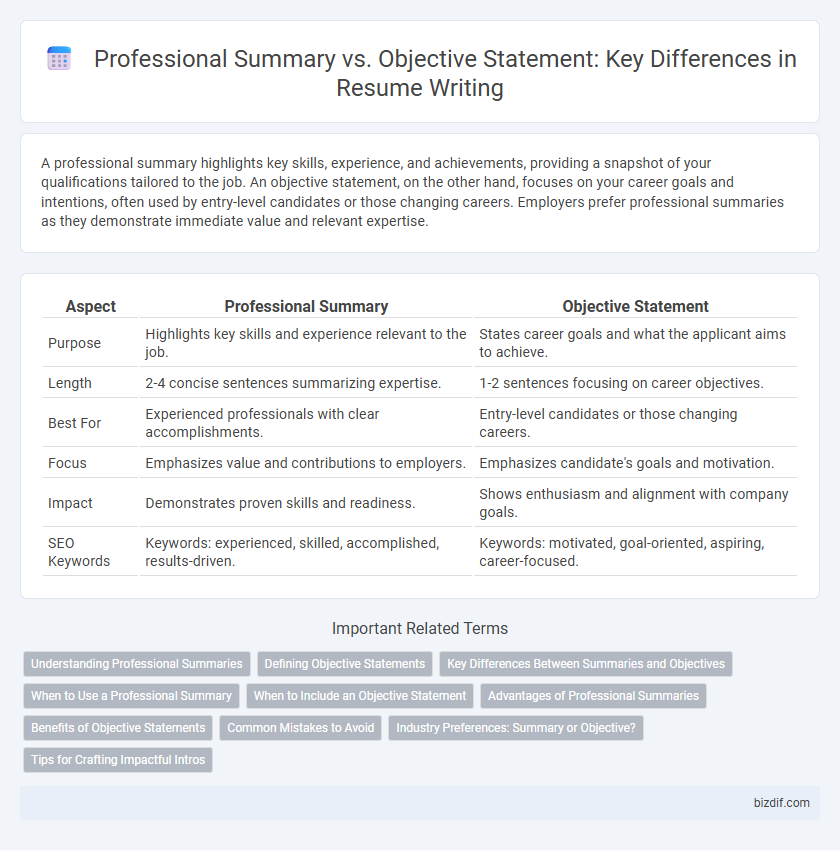A professional summary highlights key skills, experience, and achievements, providing a snapshot of your qualifications tailored to the job. An objective statement, on the other hand, focuses on your career goals and intentions, often used by entry-level candidates or those changing careers. Employers prefer professional summaries as they demonstrate immediate value and relevant expertise.
Table of Comparison
| Aspect | Professional Summary | Objective Statement |
|---|---|---|
| Purpose | Highlights key skills and experience relevant to the job. | States career goals and what the applicant aims to achieve. |
| Length | 2-4 concise sentences summarizing expertise. | 1-2 sentences focusing on career objectives. |
| Best For | Experienced professionals with clear accomplishments. | Entry-level candidates or those changing careers. |
| Focus | Emphasizes value and contributions to employers. | Emphasizes candidate's goals and motivation. |
| Impact | Demonstrates proven skills and readiness. | Shows enthusiasm and alignment with company goals. |
| SEO Keywords | Keywords: experienced, skilled, accomplished, results-driven. | Keywords: motivated, goal-oriented, aspiring, career-focused. |
Understanding Professional Summaries
Professional summaries provide a concise overview of a candidate's skills, experience, and key achievements tailored to the specific job, enabling recruiters to quickly assess qualifications. Unlike objective statements that focus on the candidate's career goals, professional summaries highlight value propositions and measurable results. Crafting a targeted professional summary with industry-specific keywords can significantly improve resume visibility in applicant tracking systems (ATS).
Defining Objective Statements
Objective statements in resume writing clearly articulate a candidate's career goals and the position they seek, providing employers with immediate insight into their intentions. These concise declarations emphasize the applicant's motivations and desired job role rather than detailing skills or accomplishments. Defining objective statements enhance resume clarity by aligning personal career ambitions with the employer's needs.
Key Differences Between Summaries and Objectives
Professional summaries highlight relevant skills, experiences, and achievements in a concise manner, targeting the employer's needs. Objective statements focus on the candidate's career goals and what they seek from the position, often emphasizing personal aspirations. Summaries are preferred for experienced professionals, while objectives suit entry-level candidates or those changing careers.
When to Use a Professional Summary
Use a professional summary on resumes when you have extensive work experience or specialized skills relevant to the job. It highlights key achievements and expertise, providing employers with a clear snapshot of your qualifications. This section is ideal for mid-career professionals, executives, or those changing industries who want to emphasize their value quickly.
When to Include an Objective Statement
An objective statement should be included in a resume when a candidate is changing careers, entering the workforce for the first time, or targeting a specific job role to clearly communicate their goals and suitability. It provides employers with a concise understanding of the applicant's intentions and how they align with the company's needs. In contrast, experienced professionals typically benefit more from a professional summary highlighting key skills and achievements rather than an objective statement.
Advantages of Professional Summaries
Professional summaries provide a concise overview of key skills, experiences, and achievements tailored to the job, enhancing recruiter engagement. They emphasize value and career highlights, making candidates stand out compared to generic objective statements. By focusing on measurable results and expertise, professional summaries improve resume relevance and increase interview opportunities.
Benefits of Objective Statements
Objective statements clarify career goals and align applicant intentions with employer needs, enhancing resume relevance. They provide concise focus for entry-level candidates or career changers by highlighting transferable skills and specific job targets. This targeted approach increases the chances of capturing recruiter attention and securing interviews.
Common Mistakes to Avoid
A common mistake in resume writing is confusing the professional summary with the objective statement, leading to unclear messaging. Overloading the summary with generic phrases rather than showcasing specific skills and achievements reduces its impact. Avoid vague objectives that focus on personal goals instead of demonstrating value to the employer, ensuring clarity and relevance in both sections.
Industry Preferences: Summary or Objective?
Industry preferences increasingly favor Professional Summaries over Objective Statements for resumes, as summaries provide a concise overview of relevant skills, experiences, and career achievements tailored to the specific job role. Professional Summaries demonstrate a candidate's value proposition and alignment with employer needs, whereas Objective Statements tend to focus more on the candidate's personal goals rather than employer benefits. Sectors like technology, finance, and healthcare particularly prioritize summaries to quickly assess qualifications and fit.
Tips for Crafting Impactful Intros
Crafting an impactful professional summary requires highlighting key skills, accomplishments, and career goals tailored to the target job, ensuring relevance and clarity. Objective statements should be concise, focusing on the candidate's career aspirations and how they align with the company's needs. Prioritize using specific keywords from job descriptions to enhance ATS compatibility and demonstrate value immediately.
Professional Summary vs Objective Statement Infographic

 bizdif.com
bizdif.com